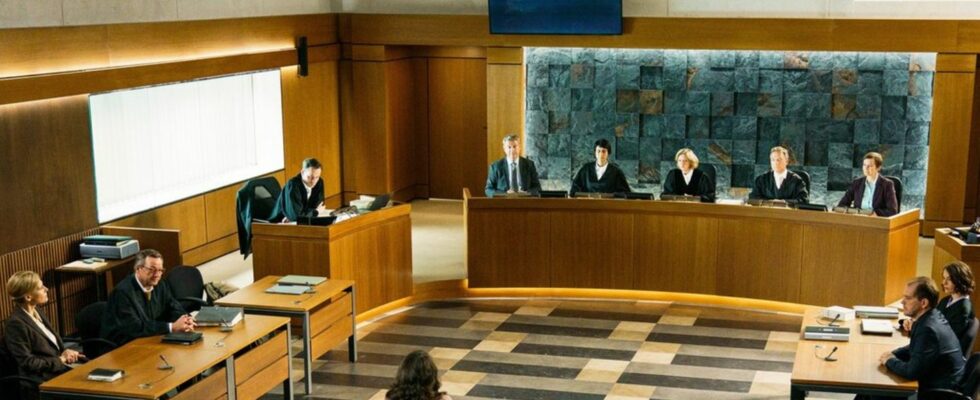The top-cast legal drama “She says. He says.” by Ferdinand von Schirach asks uncomfortable questions in a MeToo case.
His name promises unpleasant topics, fundamental questions and experiments with formats and viewers: Ferdinand von Schirach (59). Now the next challenge for the Munich writer and lawyer is on the agenda. “She says. He says.” (February 26th, 8:15 p.m., ZDF) is a MeToo story in which, after a rape allegation in a criminal trial at the Berlin district court, statement is pitted against statement.
Following the television film, the back-to-back documentary of the same name by Sandra Hardinghaus and Jörn-Andres Gerit will examine the question of how truth is created in the courtroom from 10 p.m.
That’s what the TV movie “She Says. He Says” is about.
The court is dealing with a high-profile case: The well-known TV presenter Katharina Schlüter (Ina Weisse, 55) and the industrialist Christian Thiede (Godehard Giese, 51) have had an affair that has lasted for years and is now ending in the courtroom.
Schlüter describes on the witness stand how a consensual meeting turned into rape. But can evidence such as sperm traces on her dress be considered proof? The judge listens to experts and witnesses while the two lawyers make powerful arguments.
However, an unexpected development puts the court in a difficult position when it comes to deciding on truth and credibility…
More than a personal fate
As is usually the case in Ferdinand von Schirach productions, this time the rules of German criminal law are examined and a moral dilemma is presented that goes far beyond the personal fate of those involved. Rather, it is about the social values and prejudices that shape our coexistence.
“Our penal code does not recognize the concept of evil. It describes what misdemeanors and crimes are; a situation is broken down into act, illegality and guilt,” von Schirach told the broadcaster. He further explains: “As a judge, you have to judge; you cannot avoid it. You have to decide whether a person has broken the law, whether he is guilty, whether he should be punished. It is you who decides decide the fate of the accused and the fate of the victim.”
The guilt or innocence of a person is “decided in a constitutional state not in newspapers, not on television, not on social media and not in internet forums,” he warns. Criminal proceedings are the right place for these decisions: “In a criminal trial, the judges try to find out the truth. They listen to witnesses and experts, they carefully look at the evidence presented, they examine the arguments of the public prosecutor, the co-plaintiff and the defense lawyer”, said the lawyer and writer about the process of due process.
Star director Matti Geschonneck (71, “The Wannsee Conference”) is also interested in such topics. In the legal drama he asks the question of law, morality and truth. “The viewer will be more likely to make his judgment than the court,” he believes, adding: “Prejudices can control his jurisprudence. Sympathy for one side, distrust of the other – feelings will fluctuate,” is his prediction.
Outstanding cast
It almost goes without saying that the cast is outstanding. Hardly any top star from the German film, television and theater scene can miss the unusual Ferdinand von Schirach film adaptations – again in a very chamber play-like setting.
In addition to the two protagonists already mentioned, Johanna Gastdorf (65) can be seen as the presiding judge. Henriette Confurius (33) and Matthias Brandt (62) sit opposite each other as defense attorney Breslau and attorney Biegler. Florian Bartholomäi (37) plays senior public prosecutor Heise and Bettina Lamprecht (46) plays police officer Reuther. The two “Vorstadtweiber” stars Maria Köstlinger (51) and Proschat Madani (56) embody the psychological expert Altstedt and the forensic doctor Laux-Frohnau.
“It was nice filming because there were so many great colleagues around me who were inspiring and who I always enjoyed watching,” Matthias Brandt also raved about the cast.
Exciting film adaptations based on Ferdinand von Schirach
Other sensational film adaptations based on Ferdinand von Schirach’s originals – short stories, plays and novels – include:
“Happiness” (2012, movie)
“Crime” (2013, miniseries)
“Guilt” (2014-2019, TV series)
“Terror – Your Judgment” (2016, TV film with audience voting as a live experiment)
“The White Ethiopian” (2016, TV film)
“Asphaltgorillas” (2018, movie)
“The Collini Case” (2019, film)
“God” (2020, TV film with audience vote)
“Enemies” (2021, two television films broadcast at the same time, same case from different perspective)
“Believe” (2021, miniseries)
